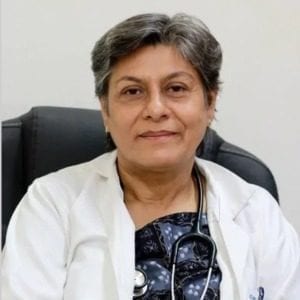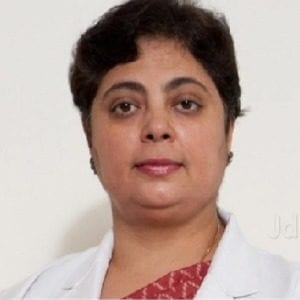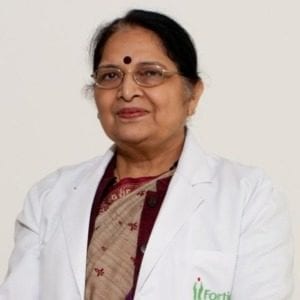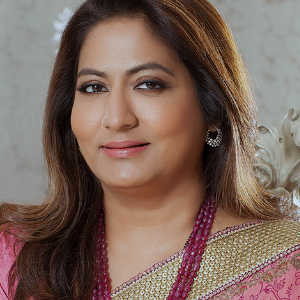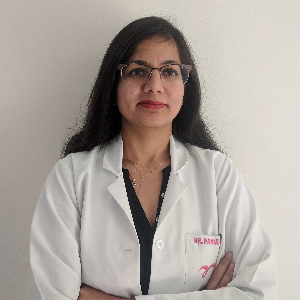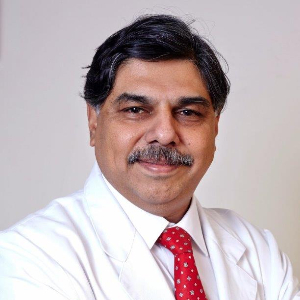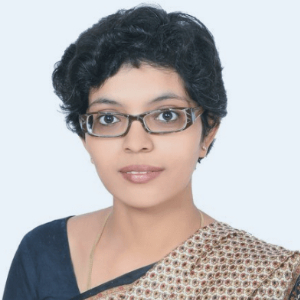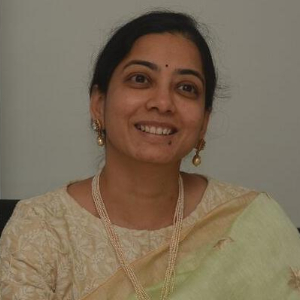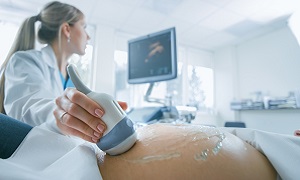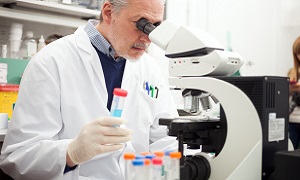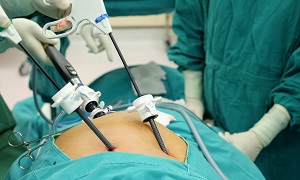Best Doctors in India for Ectopic Pregnancy Treatment
- Obstetrician & Gynaecologist, New Delhi, India
- Over 30 years’ experience
Profile Highlights:
- With around 30 years of experience, Dr Geeta Chadha is one of the leading gynecologists in Delhi. She has worked at Indraprastha Apollo Hospitals for around 22 years. Earlier she worked as a gynecologist at Kolmet Hospital as well as Sharma Nursing Home in New Delhi.
- Dr. Geeta Chadha has multiple expertise such as minimally invasive surgery like organ-preserving in women with benign gynae conditions plus infertility and high-risk obstetrics.
- Sr Consultant Doctor in Obstetrics & Gynaecology, Gurugram, India
- Over 30 years’ experience
Profile Highlights:
- Dr. Manavita Mahajan has been a practicing obstetrician & gynecologist in Gurugram for the last 30 years.
- Known for being a strong proponent of safe motherhood practices, Dr. Mahajan has worked to implement these practices in her hospital practice as well. She has also been a speaker and faculty on gynecological laparoscopy at several national conferences because of her laparoscopic surgical skills.
- Dr. Mahajan is also a trainer and faculty in various educational programs.
- Obstetrician & Gynaecologist, Gurugram, India
- Over 42 years’ experience
Profile Highlights:
- Dr. Suneeta Mittal is a renowned name in the field of obstetrics & gynecology who has done national as well as international research in women’s health leading to the introduction of emergency contraception & Medical abortion in India.
- Previously, Dr. Suneeta Mittal has served as a professor as well as head of the department of obstetrics & gynecology at All India Institute of Medical Science, New Delhi.
- She has multiple areas of expertise, such as infertility, adolescent reproductive health, endocrinological disorders, laparoscopic and hysteroscopy surgeries, as well as high-risk pregnancies.
- IVF Specialist & Gynaecologist, Gurugram, India
- Over 30 years’ experience
Profile Highlights:
- Dr. Nandita Palshetkar is one of the best and leading IVF specialists in India with expertise in all kinds of infertility treatment.
- She along with Dr. Hrishikesh Pai is responsible for starting Assisted Laser Hatching in India in 1998 and also delivered the first laser hatching twins in the country.
- With training in IVF and Micromanipulation from the University of Ghent, Belgium, Dr. Nandita Palshetkar has helped more than 25,000 couples to start a family. She along with her team of experts performs more than 3000 ART cycles every year.
- IVF Specialist & Gynaecologist, New Delhi, India
- Over 20 years’ experience
Profile Highlights:
- Dr. Parul Katiyar is a well-known Obstetrician and Gynecologist in India with expertise in Reproductive medicine and the management of infertility.
- She has close to 2 decades of experience in gynecology and obstetrics and over a decade of experience in infertility and IVF. She provides services for the management of primary and secondary infertility in couples.
- She is experienced in all types of assisted reproductive techniques and has been part of and has assisted in more than 3000 ART cycles of all forms for patients from various parts of the world.
- IVF Specialist & Gynaecologist, Gurugram, India
- Over 35 years’ experience
Profile Highlights:
- Dr. Hrishikesh Pai is a highly accomplished gynecologist and obstetrician in India and a leading IVF specialist in the country.
- He has set up several IVF centers all across the country and is associated with several hospitals as the head of the IVF department in collaboration with Bloom IVF Group.
- Dr. Hrishikesh Pai started the first Assisted Laser Hatching unit as well as the first micromanipulation procedure at Bloom IVF. He also introduced several other fertility treatment procedures and services such as Oocyte freezing and ovarian tissue freezing for patients with cancer.
- He holds an extensive experience of 35+ years in the field of IVF and fertility treatment and has helped hundreds of couples conceive and start a family.
- IVF Expert & Gynecologist, New Delhi, India
- Over 20 years’ experience
Profile Highlights:
- Dr. Kaberi Banerjee is a renowned Gynecologist in Delhi and one of leading infertility and IVF specialists in India.
- Along with her team of embryologists and experts, Dr. Banerjee has helped in over 10000 pregnancies through ART (Assisted reproductive techniques).
- She received her training in IVF and fertility treatment from the renowned Guys and St Thomas Hospital in London and also served as the Clinical Fellow at the Hospital for a year.
- IVF Specialist & Gynaecologist, Hyderabad, India
- Over 10 years’ experience
Profile Highlights:
- Dr. Lakshmi Chirumamilla is a Gynecologist and Obstetrician based out of Hyderabad and specializes in all types of Assisted Reproductive Techniques (ART).
- She has been part of various infertility clinics in the UK as an Infertility Specialist and is also a trainer for assisted reproduction, IUI, embryo transfer, and the management of infertile couples accredited by British Fertility Society.
- Dr. Chirumamilla has completed her certificate courses in assisted reproduction and infertility under the aegis of the British Fertility Society as well as the Royal College of Obstetricians and Gynecologists.
- IVF Specialist & Gynaecologist, New Delhi, India
- Over 22 years’ experience
Profile Highlights:
- Dr. Sunita Arora is a leading infertility specialist in New Delhi who specializes in IUI, IVF, laparoscopies, hysteroscopies, and repeated IVF failure cases
- After completing her education, she joined the Department of Obstetrics and Gynecology, at Govt Medical College as a consultant. Later she moved to Mount Sinai Hospital, New York, from where she received her training in IVF and Reproductive Medicine.
- IVF Specialist & Gynaecologist, Gurugram, India
- Over 20 years’ experience
Profile Highlights:
- Dr. Meenu Handa is a gynecologist and IVF specialist, who serves as the Unit Head of the Fortis Bloom IVF Centre at Fortis Memorial Research Institute in Gurugram.
- She specializes in multiple areas which include male infertility, recurrent IVF specialties, intracytoplasmic sperm injection, and endoscopic fertility surgeries.
Best Hospitals in India for Ectopic Pregnancy Treatment
Rela Hospital, Chennai
- City: Chennai, India
Hospital Highlights:
- RIMC is a multi-specialty hospital in a sprawling area of 36 acres located in Chromepet, Chennai, Tamil Nadu, India.
- The facility has 450 beds including 130 critical care beds, 9 operating rooms, modern reference laboratories and radiology services, and is conveniently located near road, rail and air transportation.
- RIMC is led and managed by world-renowned physicians committed to healthcare.
- RIMC offers the broadest range of clinical care, education, and research. The hospital offers state-of-the-art technology and modern treatment facilities designed to provide health care at an affordable cost.
- Rela Institute is driven by patient needs, comfort and confidence.
CARE Hospitals, Hyderabad
- City: Hyderabad, India
Hospital Highlights:
- CARE Hospitals were established in the year 2000, by CARE Group.
- The multispecialty hospital has 435 beds, including 120 critical care beds, with an annual inflow of 180000 outpatients and 16,000 in-patients.
- The hospital provides specialty medical services in Cardiology, Cardiothoracic Surgery, Pediatric Cardiology, Pediatric Cardiothoracic Surgery, Neurology, Neurosurgery, Nephrology, and Urology.
- The hospital has the first dual source, 128 slice CT scanner (for high precision cardiac imaging) – the first of its kind in south India.
- The hospital offers a wide range of accommodation facilities for the convenience of its varied patient base, ranging from general wards to super deluxe rooms.
Fortis Hiranandani Hospital, Mumbai
- City: Mumbai, India
Hospital Highlights:
- Fortis Hiranandani hospital was established in 2007.
- The hospital is an advanced tertiary care, multi-specialty hospital equipped with 149 beds.
- The hospital is equipped with a super ICU to provide emergency medical care to critically ill patients.
- The hospital is NABH accredited.
- The critical care facility in the hospital is augmented with the state-of-the-art facilities that facilitate speedier diagnosis and efficient monitoring.
- The hospital provides specialty medical services in cardiology, orthopedic science, pediatric science, neurology, diabetic care, urology, nephrology, ENT, obstetrics, gynecology, cosmetic surgery, bariatric surgery, neuro and spine care.
Fortis Hospital, Anandpur, Kolkata
- City: Kolkata, India
Hospital Highlights:
- Fortis Hospital, Anandapur, Kolkata is a world-class super-speciality equipped with the latest technologies in the medical world.
- The hospital is NABH accredited.
- This state-of-the-art facility specializes in cardiology and cardiac surgery, urology, nephrology, neurosciences, orthopaedics, digestive care, emergency care and critical care.
- The hospital, governed by integrated Building Management System (IBMS), has a pneumatic chute system, for quick vertical and horizontal transportation between floors, facilitating speedy transfer of patient specimens, documents, reports, and medicines to the concerned departments.
- The hospital also has a nephrology department with over 28 advanced dialysis units.
Fortis Hospital Banerghatta, Bengaluru
- City: Bengaluru, India
Hospital Highlights:
- Fortis Hospital Bannerghatta, Bengaluru was established in 2006.
- The hospital is a 276 bedded multi-specialty tertiary care facility.
- The hospital specializes in cutting-edge medical technology and dedicated patient care services.
- The hospital is equipped with state-of-the-art technologies like trans-radial angioplasty, trans-abdominal cardiac surgery, and computerized TKR navigation surgery.
- The hospital provides specialty medical services in cardiology, cardiac surgery, orthopedics, neurology, neuro-surgery, GI, and Minimal Access Surgery (MAS).
Gleneagles Global Hospital, Parel, Mumbai
- City: Mumbai, India
Hospital Highlights:
- Gleneagles Global Hospital The 450-bed facility comprises of 17-stories, housing state-of-the-art infrastructure, and advanced medical care facilities.
- The hospital offers end-to-end clinical, surgical, and diagnostic services. It is equipped with a team of eminent medical professionals aided by qualified nurses and medical staff
- The Hospital offers advanced Endoscopic procedures, Hepatobiliary and Liver Surgeries, Surgical and Medical Gastroenterology, Bariatric Surgery, and Robotic surgery.
- The hospital is a center of excellence for Orthopedics, Joint Replacement, Knee Replacement, and Hip Replacement surgery.
Manipal Hospital, Dwarka, Delhi
- City: New Delhi, India
Hospital Highlights:
- Manipal Hospitals, Dwarka, is a super-specialty hospital in Dwarka, New Delhi, which is a part of Manipal Hospitals Group.
- The hospital aims to provide the best treatment on par with international standards at a fraction of the cost.
- Equipped with 380 beds, the hospital is also one of the new age hospitals which are equipped fully with state-of-the-art infrastructure, cutting-edge technology as well as the latest and advanced clinical practices. The hospital also has 13 modular Operation theatres with 118 beds which are solely meant for critical care.
- The hospital comprises internationally acclaimed doctors and highly professional and experienced hospital and medical staff who are able to provide preventive, therapeutic, and diagnostic services all under one roof.
Paras Hospital, Gurugram
- City: Gurugram, India
Hospital Highlights:
- Paras hospital was established in 2006 and is the 250 bedded flagship hospital of Paras Healthcare.
- The is supported by a team of doctors of international and national repute.
- The hospital is NABH accredited and also the first hospital in the region to have a NABL accredited laboratory.
- The hospital provides specialty medical services in around 55 departments including Neurosciences, Joint Replacement, Mother & Child Care, Minimal Invasive Surgery, Gynecology and Obstetrics, Ophthalmology, Dermatology, Endocrinology, Rheumatology, Cosmetic and Plastic surgery.
- The hospital is equipped with state-of-the-art technologies.
S L Raheja Hospital, Mahim, Mumbai
- City: Mumbai, India
Hospital Highlights:
- SL Raheja hospital is a 140-bed multi-specialty tertiary care hospital that is being managed by Fortis Healthcare Ltd.
- The hospital is a benchmark in healthcare and medical facilities in the neighborhood of Mahim & the western suburbs.
- L.Raheja Hospital, Mahim has one of the most effective ICU and Casualty care services.
- The hospital provides specialty medical services in Cardiology, Oncology, Neurology, Orthopedics, Mother & Child Care, and in Diabetes.
Wockhardt Hospitals, Mumbai
- City: Mumbai, India
Hospital Highlights:
- Wockhardt Hospitals were established in the year 1973, originally called First Hospitals and Heart Institute.
- Wockhardt Hospitals are super specialty health care networks in India, nurtured by Wockhardt Ltd, India’s 5th largest Pharmaceutical and Healthcare company.
- Wockhardt Hospitals is associated with Partners Harvard Medical International, an international arm of Harvard Medical School, USA.
- Wockhardt Heart Hospital performed India’s first endoscopic heart surgery.
- The hospital has a state-of-the-art infrastructure equipped with the latest technologies and modern equipment.
- It has special Centers of Excellence dedicated to the major specialties to provide hassle-free and high-quality clinical care.
Ectopic Pregnancy
When a fertilized egg implants itself outside of the uterus, it is termed as ectopic pregnancy. It’s also referred to as tubal pregnancy, as most of such pregnancies happen in the fallopian tubes. The problem can be with the egg or the tube and the egg get stuck on the journey to the uterus.
An ectopic pregnancy can also occur in other parts of the body, such as the ovary, abdominal cavity or the lower part of the uterus. This kind of pregnancy is unable to proceed normally. The fertilized egg is unable to survive and the growing tissue can cause life-threatening bleeding if it is left untreated.
Doctors usually consider how far the pregnancy has progressed and how severe the symptoms are before they proceed with their treatment.
Symptoms
Symptoms might not be noticeable at first for some women. But for others, a missed period, breast tenderness as well as nausea are common symptoms. If you take a pregnancy test, the result will show as positive. However, an ectopic pregnancy can’t continue as normal. Signs and symptoms become more noticeable over time, as the fertilized egg grows in the improper place.
Light vaginal bleeding and pelvic pain, are often the first warning signs of an ectopic pregnancy. If blood leaks from the fallopian tube, you might feel shoulder pain or an urge for a bowel movement. The specific symptom which you experience usually depends on where the blood collects and on which nerves are irritated.
Emergency Symptoms
If the fertilized egg continues growing in the fallopian tube, it can cause a rupture of the tube. Heavy bleeding inside the abdomen is also likely. This can be life-threatening and might show symptoms such as lightheadedness, fainting and shock.
If you are seeing any signs and symptoms of an ectopic pregnancy, such as severe abdominal or pelvic pain accompanied by vaginal bleeding, shoulder pain or extreme lightheadedness, you should consider seeking emergency medical help.
Causes
A tubal pregnancy which is the most common type of ectopic pregnancy, happens when a fertilized egg is stuck on its way to the uterus, as the fallopian tube might be damaged due to inflammation or is misshapen. Hormonal imbalances or abnormal development of the fertilized egg might play a role as well.
Diagnosis
A pelvic exam might also help your doctor identify areas of pain, tenderness or a mass in the fallopian tube or the ovary. Your doctor will not be able to diagnose an ectopic pregnancy by examining you alone. Blood tests as well as ultrasounds will be required.
Pregnancy test
Ultrasound
Using transvaginal ultrasound, your doctor can see the exact location of your pregnancy. A wand-like device will be placed into the vagina for the test. This test uses sound waves in order to create images of your uterus, ovaries and fallopian tubes. The pictures are then sent to a nearby monitor.
Abdominal ultrasound is another type of ultrasound where the wand is moved over your belly and it may be used to confirm the pregnancy or evaluate for internal bleeding.
Other blood tests
A complete blood count will also be required to check for anemia as well as other signs of blood loss. If you’ve been diagnosed with ectopic pregnancy, your doctor might also order tests to check your blood type just in case you require a transfusion.
Treatment
It is not possible for the fertilized egg to develop normally outside the uterus. Therefore, the ectopic tissue will need to be removed, to prevent serious life-threatening complications. This might be done using a medication, abdominal surgery or laparoscopic surgery, depending on your symptoms and the time the pregnancy was discovered.
Medication

Medication such as methotrexate can also be used to an early ectopic pregnancy where there is no unstable bleeding. This medication can stop cell growth and also dissolve existing cells. It is given through injection. However, before receiving this kind of treatment, confirming the diagnosis is extremely important.
After the injection, the doctors will order another HCG test for determining how well the treatment is working and to see if you will be requiring any more of this medication.
Laparoscopic procedures
Salpingostomy and salpingectomy are two laparoscopic surgeries that are also used to treat some kinds of ectopic pregnancies.
In a salpingostomy, the ectopic pregnancy is removed after which the tube left is to heal by itself. While in a salpingectomy, the ectopic pregnancy and the tube both are removed.
Depending on the amount of bleeding you are facing, and the damage, it will be decided which procedure is best for you.
Emergency surgery:
If the ectopic pregnancy is leading to heavy bleeding, you may also require emergency surgery. which can be done laparoscopically or through an abdominal incision. It is possible to save the fallopian tube in some cases, though typically a ruptured tube needs to be removed.
Risk factors
Some of the factors which can make someone more likely to have ectopic pregnancy include-
- Inflammation or infection: Sexually transmitted infections like gonorrhea or Chlamydia, might cause inflammation in the tubes and other nearby organs, which might increase your risk of an ectopic pregnancy.
- Previous ectopic pregnancy: Previously if you have had this type of pregnancy, you might be likely to have one more.
- Fertility treatments: According to research, it has been suggested that women who have undergone IVF or similar treatments are more likely to have an ectopic pregnancy. Infertility might raise the risk as well.
- Tubal surgery: Surgery for correcting a closed or damaged fallopian tube can increase the risk of an ectopic pregnancy.
- Smoking: Cigarette smoking just before you get pregnant might also increase the risk of an ectopic pregnancy.
Prevention
Though there is no way to prevent an ectopic pregnancy, limiting the number of sexual partners and using condoms during sex can help in preventing STDs, which reduces the risk of pelvic inflammatory disease. It is also important to avoid smoking or inhaling smoke when one is pregnant.

